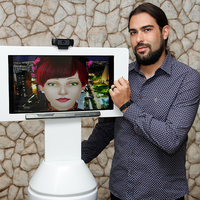Artificial intelligence & robotics
Julian Schrittwieser
AlphaGo beat the world’s best Go player. He helped engineer the program that whipped AlphaGo.

Europe
Samantha Payne
Children without upper limbs are becoming superheroes with the inexpensive, personalised Hero Arms prostheses

Latin America
Antonio Henrique Dianin
His telepresence robot inspired by “The Big Bang Theory” helps health personnel to assist their patients

Latin America
Aline Oliveira
She predicts the performance of family run agricultural farms to facilitate their access to more advantageous loans and reduced financial risk

Latin America
Cristina de la Peña
She can revolutionize advertising and 'marketing' with her technology to analyze, in real time, the reactions of the public to a campaign
